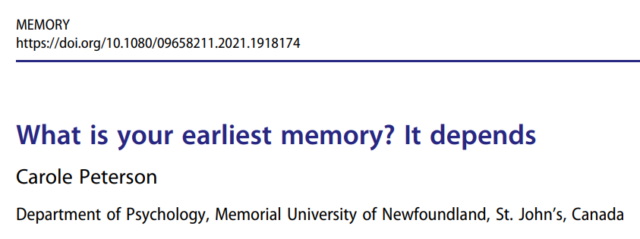The earliest memory of mankind starts at 2 and a half years old
- Normal Liver Cells Found to Promote Cancer Metastasis to the Liver
- Nearly 80% Complete Remission: Breakthrough in ADC Anti-Tumor Treatment
- Vaccination Against Common Diseases May Prevent Dementia!
- New Alzheimer’s Disease (AD) Diagnosis and Staging Criteria
- Breakthrough in Alzheimer’s Disease: New Nasal Spray Halts Cognitive Decline by Targeting Toxic Protein
- Can the Tap Water at the Paris Olympics be Drunk Directly?
Studies have shown that the earliest memory of mankind starts at 2 and a half years old
The earliest memory of mankind starts at 2 and a half years old. If you are asked to recall things from childhood, especially preschool (before 7 years old), you will find that what you can recall is usually some memory fragments, which are difficult to form a complete memory. This situation is also called “child amnesia” .
Some people can’t recall the things they knew before the age of 5, but some people can remember the things before the age of 3 or even 2. So, when does a person begin to have memory after he is born? This issue has been inconclusive. Previous studies believed that around three and a half years old is the earliest age for humans to produce memories.
Recently, Carole Peterson of Memorial University of Newfoundland, Canada published a paper titled: What is your earliest memory? It depends in Memory journal.
The authors of the paper have analyzed the published and unpublished data collected in their laboratory for 21 years and found that, on average, the earliest memories people can recall can be traced back to when they were two and a half years old. This advances the age of the earliest human memory previously thought to be one year forward.

Carole Peterson, an expert on childhood amnesia and the author of the paper, said that a person’s earliest memory is actually a moving target, not a single static memory. Therefore, when a person is asked about their earliest memory, many people cannot provide a clear boundary or watershed for memory. On the contrary, it seems to be a potential memory pool from which both adults and children can extract memories.
Carole Peterson believes that many people actually start to have memories after they are 2 years old, but many times they don’t realize this. There are two reasons for this. First, by asking a person’s earliest memory, and then asking about earlier memories, it is easy for people to remember earlier memories. Secondly, many people make mistakes about the age of the earliest memory. Often people think that their age at the earliest memory is older than their actual age.
For more than 20 years, Carole Peterson has been engaged in memory research, with particular attention to the ability of children and adults to recall their early years. In this paper, Carole Peterson reviewed his 10 research papers on childhood amnesia, and then analyzed published and unpublished data collected since 1999. There were 992 participants, and the memories of 697 participants were compared with the memories of their parents.
In general, the comparison results show that the earliest memories of these children appeared earlier than they thought, and the parents confirmed this.
For example, in one of the studies, Carole Peterson conducted interviews two and eight years after the children’s earliest memories. In these two interviews, they were able to recall the same memories, but after eight years, they were able to recall the same memories. In this interview, they gave the age of their earliest memory later than the age given in the interview two years later. Eight years later, they believed that the age at which they produced memories was one year older than they actually were.
In other words, as they grow older, children will continue to change the age they think they have when they have those early memories. Carole Peterson believes that this is due to the expansion effect of memory data. When you recall things from a long time ago, the farther the memory is, the expansion effect will make you feel closer. Therefore, when they recalled 8 years later, they narrowed the memory of that year and regarded the memory at the age of 2 and a half as occurring at the age of 3 and a half.
But Carole Peterson also found that when they remembered things that were four years old and older, this stretching effect would not happen again.
Finally, Carole Peterson said that after combing all the data, it clearly shows that people have more childhood and more distant childhood memories than they thought, and it is not difficult to help them acquire these memories.
In general, the paper shows that people’s earliest memories are fluid, and how early a person’s earliest memories is depends largely on whether they have been asked multiple times, how many early memories are requested when asked, and The way of inquiring and so on. But in general, the study shows that a person’s earliest memories are earlier than they think. On average, the earliest memories people can recall can be traced back to when they were two and a half years old. This advances the age of the earliest human memory previously thought to be one year forward.
(source:internet, reference only)
Disclaimer of medicaltrend.org
Important Note: The information provided is for informational purposes only and should not be considered as medical advice.



